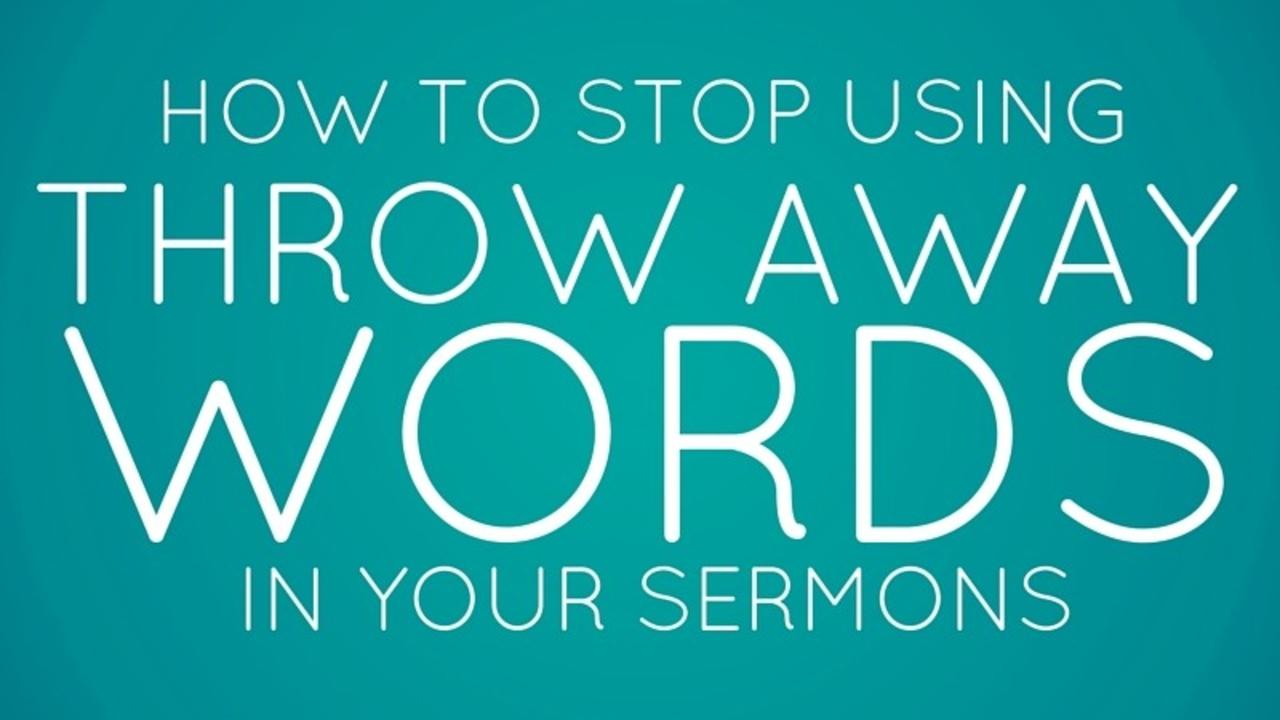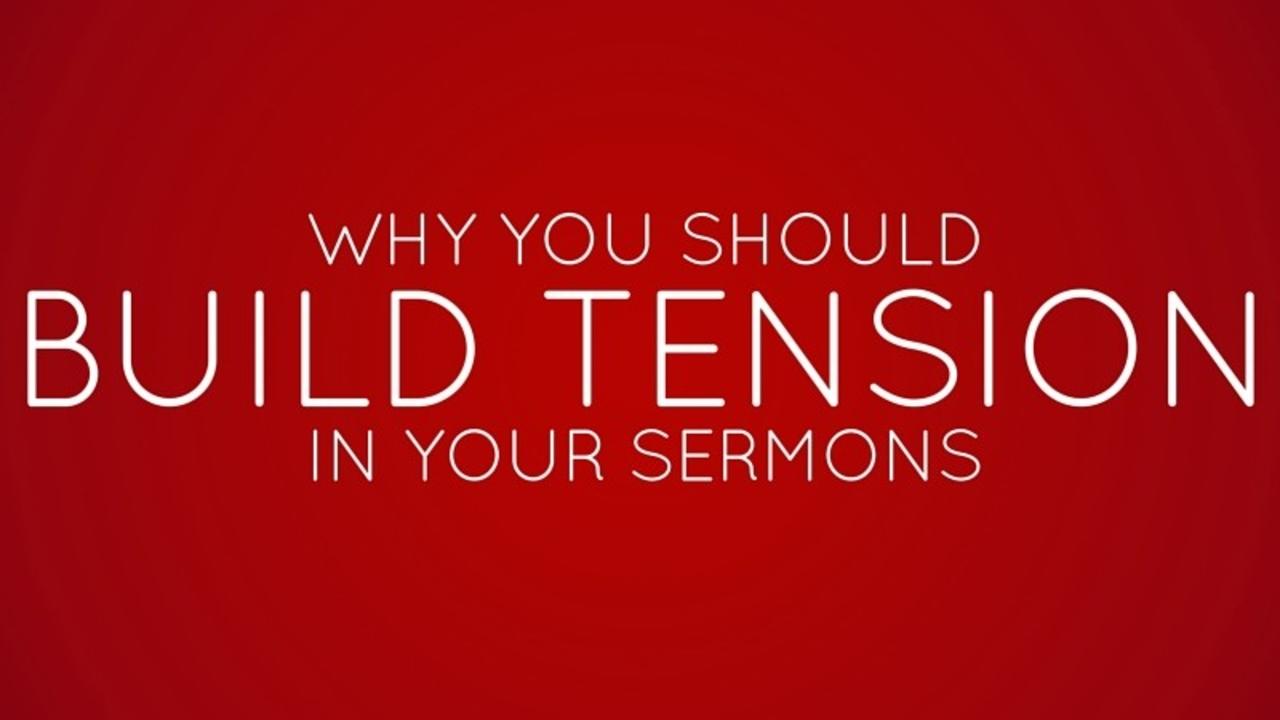Why Great Preachers have a Balance of Intensity and Relief

Gibson could have written the movie where it begins intense, remains intense for the entire film and ends with great intensity. The problem with that approach is that viewers can only take so much. There has to be a balance of intensity and relief.
This same principle applies to preaching. I once preached a sermon on how to change. The sermon was intense because it dealt with the fallen human condition. I talked about addiction, abuse, p
...Why Shorter Sermons Are Almost Always Better

Shorter sermons are almost always better. You might say, “Well, Matt Chandler speaks for an hour and he has hundreds of thousands of people listening to him!” Okay, sure, but he’s engaging, insightful and a captivating communicator. Not everybody can do what Matt Chandler does. But even if you can do all of those things for an hour, it doesn’t mean you should. Few public speakers can keep an audience’s attention for that long. Few should even try. Here are three reasons why shorter sermons are almost always better:
1. You don’t need to say everything in a single sermon.
We often think back on a sermon and ask ourselves: Did I say all the words that I needed to say? The better question is: Did they hear what they needed to hear so they can do something with it? Part of the reason you may speak for a long time is you think you need to say everything…
Everything that you could possibly point out that is in a given passage.
Everything that a Greek word could mean.
Everything you learned in...
How to Stop Using Throw Away Words in Sermons

Pauses are great. They can add emphasis and give more weight to your point. A well-placed pause is a powerful public speaking tool that you should know how to use.
But the wonderful effect of a pause is destroyed by a terrible public speaking mistake preachers make: the audible pause. What’s an audible pause?
Well, um, it’s uh, um, I think it’s uh… (Sorry, just had to do that).
An audible pause is when you fill in the gaps of your speech with throw away words like “um” “uh” “you know” “like” and others.
These throw away words are a huge distraction, and every public speaker must deal with them if they are going to stand out. To audibly pause is natural. To quit audibly pausing is a lot of work, but it’s what separates the preachers from the donkeys. Here’s how to stop using throw away words in sermons:
1. Rehearse your sermons out loud.
This is a vital step to successful delivery. It amazes me how many preachers don’t rehearse their sermons out loud before they deliver. Rehearsing all...
10 Observations About Preaching to Older Crowds

My church has two Sunday services. The earlier service is a more traditional worship environment. This service tends to be attended by an older demographic. From my experience of preaching this service I have made some observations about preaching to older crowds:
1. Older crowds are way more receptive to young preachers than you might think.
Sometimes when I preach about a topic that I don’t think they’ll be comfortable with (social issues and vices), they surprise me with how positively they respond to it.
2. They appreciate straight-forward, tell-it-like-it-is kind of preaching.
If you don’t hold back, but just really give it to them, they’ll like it. As long as you’re not a young, know-it-all jerk about it. They’ve been around long enough to see through that stuff.
3. If you are funny, humor works with older crowds.
If you’re funny, they’ll laugh at your jokes. But not all of them. You’re speaking to a different generation so you have to learn what makes them laugh. Humor can be a g...
5 Easy Steps to Put People to Sleep With Your Preaching

There’s nothing like a good snoozer of a sermon. We’ve all sat through them. We’ve all given them at one point or another. But what does it take to preach a sermon that makes your listeners fall sound asleep? What does it take to defy everyone’s ability to pay attention? If you aspire to give boring sermons that help your people catch up on rest while you preach, here are five easy steps:
1. Don’t adequately prepare.
The first step to get everyone shutting their eyes is to not prepare. This part is easy. You want to stand up and not have anything of substance to say. You want to just repeat some things you already know and have already said so they will check out and go to sleep.
2. Have no clear focus.
You need to be totally unclear about the direction you want to take the sermon. Your people will pick up on this and decide it’s not worth listening because you haven’t figured it out yet. Follow every rabbit trail in your head so that your rambling doesn’t support your point at all (...
Why You Should Build Tension in Your Sermons

As a preacher, it’s easy to focus on your content and not really consider if your listeners are ready to hear it.
You’ve been studying your material all week, and you’re totally energized by it. It’s all you’ve thought about for days. You are so excited to finally share these thoughts that are bursting out of you.
But your listeners aren’t there yet. They walked into church with everything on their minds except your sermon. They have nowhere near the same level of enthusiasm about your topic that you have.
That’s the way it works. You care. They probably don’t.
So what can you do?
One of the most basic theories of communication is Aristotle’s’ ethos, pathos, logos. This theory suggests that the best public speaking has all three:
Ethos, a credible speaker
Pathos, a message that moves people at a visceral level
Logos, a message that makes sense
In other words, your listeners are subconsciously requiring three things out of you if they are going to give you the right to speak to the...
Three Ways to Speak Less and Listen Better

Not long after we were married, my wife told me I was using “preacher voice” with her and she really wished I would just have a normal conversation. I asked her what she meant by “preacher voice.” She told me that when I start talking I sometimes default into giving a mini-sermon about the topic. I use a slightly louder voice and get kind of preachy. We had a good laugh about it, but it made me think about how that comes across to others.
She also told me that it is hard to interject because I go on and on without stopping. Her theory is that because I teach and preach a lot I have trained myself to talk continuously without pause.
This “skill” is useful in preaching, but it can be detrimental to your interpersonal relationships. One-sided conversations are no fun. Not only that, but if all you do is talk and never listen to others, your actual sermons become void of the meaningful depth you get from interacting with humanity.
So, these are three things I have done in my marriage re...
How to Preach Like You’re Having a Conversation With Everyone in the Room
The best sermons are conversations. You want to make everyone feel as if you are having a conversation with them. Like they’re the only person in the room. Like you’re sitting at a table with with them and discussing a problem, a concern, a big thing God wants them to do.
Two primary points of feedback I’ve heard recently about my sermons:
You come across very personable when you preach.
You have a conversational preaching style.
In most cases people explain how my approach makes them feel. They say that it is disarming because they can relate to me like I’m a real person – not a disconnected preacher guy. Because I seem authentic, they trust me and want to listen.
I understand that not everyone takes a conversational approach, and I’m not saying conversational style is the only way, but I am suggesting it’s worth a try. Here is a way to experiment with a conversational approach:
1. When you prepare, think about the obvious questions or objections that people will have about the ...
If God Can Speak Through a Donkey, He Can Speak Through You
Welcome to Preaching Donkey! This blog is about becoming better at communicating the message you want to get across. A lot of preaching resources focus on content; this one is more about communication.
Some topics I write about include sermon prep, sermon structure, sermon length, conversational preaching, getting feedback, rehearsing sermons, public speaking tools, maximizing impact, and anything else related to perfecting the art of preaching.
Who am I? I’m Lane. Do I know everything about preaching? Of course not. I have a lot to learn like everyone else. I just want to share my thoughts and start a conversation. I write about principles I’ve learned from nearly ten years of preaching regularly in a variety of contexts and studying communication in college.
While working on my seminary degree in pastoral ministry, I noticed that my preaching courses focused mostly on theological accuracy, biblical exegesis and sermon structure. These are all necessary, but communicating effect...


